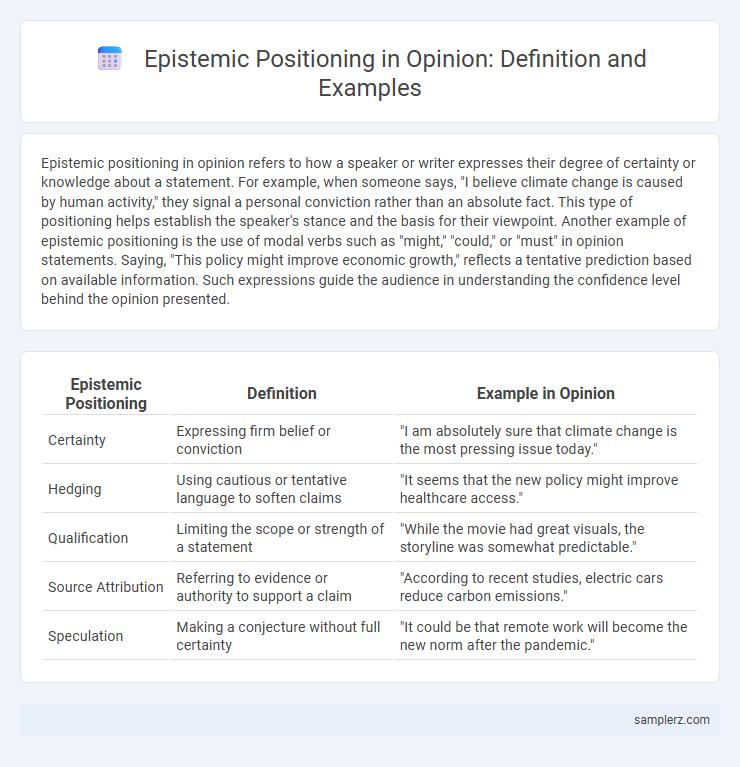Epistemic positioning in opinion refers to how a speaker or writer expresses their degree of certainty or knowledge about a statement. For example, when someone says, "I believe climate change is caused by human activity," they signal a personal conviction rather than an absolute fact. This type of positioning helps establish the speaker's stance and the basis for their viewpoint. Another example of epistemic positioning is the use of modal verbs such as "might," "could," or "must" in opinion statements. Saying, "This policy might improve economic growth," reflects a tentative prediction based on available information. Such expressions guide the audience in understanding the confidence level behind the opinion presented.
Table of Comparison
| Epistemic Positioning | Definition | Example in Opinion |
|---|---|---|
| Certainty | Expressing firm belief or conviction | "I am absolutely sure that climate change is the most pressing issue today." |
| Hedging | Using cautious or tentative language to soften claims | "It seems that the new policy might improve healthcare access." |
| Qualification | Limiting the scope or strength of a statement | "While the movie had great visuals, the storyline was somewhat predictable." |
| Source Attribution | Referring to evidence or authority to support a claim | "According to recent studies, electric cars reduce carbon emissions." |
| Speculation | Making a conjecture without full certainty | "It could be that remote work will become the new norm after the pandemic." |
Understanding Epistemic Positioning in Opinion Writing
Epistemic positioning in opinion writing reflects how authors express their degree of certainty or stance towards the truth of their claims, often through modal verbs, hedging phrases, or assertive language. By explicitly signaling levels of knowledge or belief, writers guide readers in interpreting the strength and reliability of their arguments. Understanding these linguistic cues enhances critical reading skills and helps evaluate the validity of subjective viewpoints.
How Personal Beliefs Shape Epistemic Stances
Personal beliefs act as a foundational lens through which individuals evaluate information, significantly shaping their epistemic stances. These beliefs influence the acceptance, interpretation, and prioritization of evidence, leading to varied explanations and conclusions across different epistemic frameworks. Understanding this dynamic is crucial for analyzing how opinions are formed and defended within diverse knowledge communities.
Epistemic Authority: Claiming Expertise in Opinions
Epistemic positioning in opinion often involves asserting epistemic authority by explicitly referencing credentials, experience, or specialized knowledge to validate claims. Experts in fields such as medicine, law, or science frequently establish epistemic authority to strengthen the credibility of their opinions. This strategic positioning enhances the persuasive power of opinions by aligning them with recognized expertise and reliable evidence.
Expressing Certainty and Doubt in Opinion Articles
Epistemic positioning in opinion articles often hinges on expressing certainty or doubt to influence reader perception and credibility. Writers employ modal verbs like "must" or "might" to signal degrees of confidence, guiding audience interpretation of claims. Strategic use of evidential phrases such as "according to research" or "it seems" further calibrates the strength of assertions within the opinion text.
The Role of Evidence in Epistemic Positioning
Epistemic positioning in opinion heavily relies on the role of evidence to establish credibility and justify claims. Individuals often align their viewpoints by presenting empirical data, expert testimony, or logical reasoning to strengthen the validity of their stance. This reliance on evidence shapes the persuasive power and perceived reliability of the opinion expressed.
Distinguishing Fact from Belief in Opinion Pieces
Epistemic positioning in opinion pieces involves clearly distinguishing facts from personal beliefs to enhance credibility and clarity. Writers support their arguments with verifiable evidence while explicitly labeling subjective interpretations or assumptions as opinions. This practice helps readers critically evaluate information, fostering informed and balanced understanding.
Hedging Language as an Epistemic Strategy
Hedging language functions as a critical epistemic strategy by allowing speakers to express opinions while signaling uncertainty or openness to alternative interpretations. Phrases like "it seems," "possibly," and "could be" mitigate the speaker's commitment to absolute truth, reflecting a measured stance on knowledge claims. This linguistic approach enhances dialogic interaction by facilitating respectful discourse and acknowledging the provisional nature of opinion-based assertions.
Engaging Readers through Epistemic Alignment
Epistemic positioning in opinion writing involves aligning the author's knowledge stance with readers' beliefs to foster engagement and trust. Using phrases like "based on current research" or "it is widely accepted" signals credible knowledge sources, enhancing the author's authority and inviting readers to reconsider their views. This alignment strategically bridges gaps between subjective opinions and objective evidence, deepening reader involvement and encouraging reflective thinking.
Epistemic Responsibility in Sharing Opinions
Epistemic responsibility in sharing opinions involves carefully evaluating the credibility of sources and the evidence supporting one's claims before expressing them publicly. Recognizing the limits of one's knowledge and avoiding unwarranted assertions helps maintain intellectual honesty and fosters constructive dialogue. By prioritizing accuracy and transparency, individuals contribute to a more informed and respectful exchange of ideas.
Impact of Epistemic Positioning on Persuasion
Epistemic positioning significantly influences persuasion by establishing the speaker's credibility and shaping the audience's trust in the argument presented. When an opinion-holder clearly indicates their knowledge source or acknowledges uncertainty, it enhances persuasive power by fostering openness and intellectual humility. This strategic presentation of epistemic stance directly affects how convincingly ideas are received and accepted.

example of epistemic positioning in opinion Infographic
 samplerz.com
samplerz.com